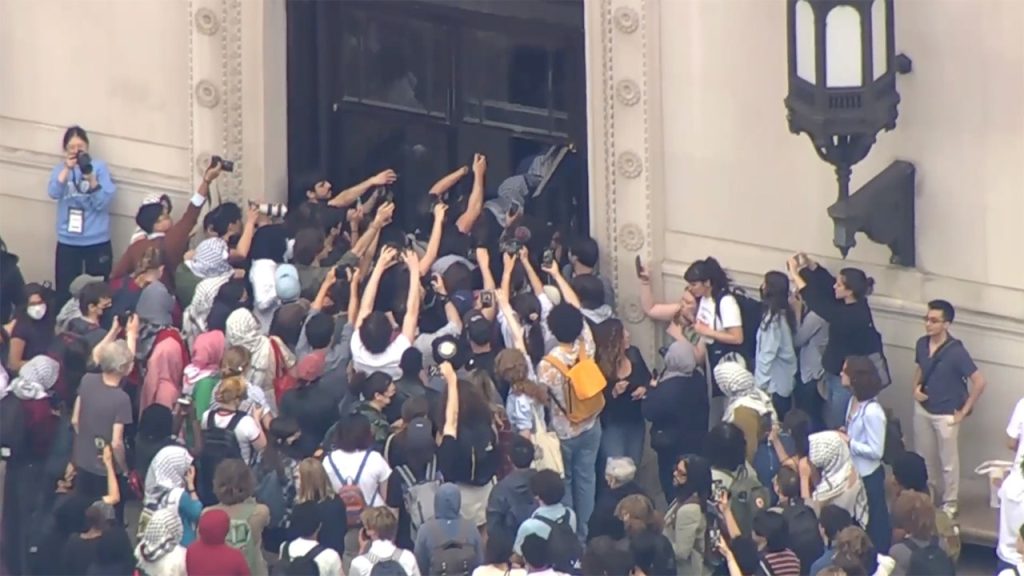A significant protest unfolded at Columbia University on Wednesday, as over 100 masked demonstrators stormed the Butler Library, disrupting final exams for many students. In response to this chaotic situation, university officials summoned the New York Police Department (NYPD) to assist, leading to the arrest of at least 30 individuals. The demonstration was reportedly in support of Mahmoud Khalil, a former student facing serious legal issues related to prior protests against Israel, raising concerns about campus safety and student rights during a turbulent time in university history.
| Article Subheadings |
|---|
| 1) Unruly Protest at Columbia University |
| 2) Legal Implications for Protesters |
| 3) University’s Response to the Situation |
| 4) Reactions from Local Officials and Students |
| 5) Broader Implications for Campus Activism |
Unruly Protest at Columbia University
On a Wednesday afternoon, Columbia University became the epicenter of heated protests as more than 100 masked anti-Israel activists infiltrated the Butler Library. This disruption coincided with the university’s final exams, forcing numerous students to abandon their studies. Eyewitness accounts suggest that participants were chanting “Free Palestine,” symbolizing their support for the Palestinian cause.
The tumult led to an emergency response from university officials, who sought assistance from the NYPD to manage the situation. The demonstrators reportedly pushed through security checkpoints, causing panic and making an already stressful exam period for students even more difficult.
Among the protesters was Mahmoud Khalil, previously arrested for his involvement in pro-Palestinian protests. His case has raised eyebrows and sparked discussions about the limits of free expression versus public safety on college campuses.
Legal Implications for Protesters
In the wake of the protests, legal authorities are closely monitoring the situation. The NYPD reported that at least 30 individuals were arrested, with more expectations looming. U.S. Immigration and Customs Enforcement (ICE) was also actively involved, suggesting that some detainees may not be U.S. citizens. ICE intends to investigate the immigration status of those arrested, which could further complicate the legal ramifications for the protesters.
A source within ICE referenced the event as a critical opportunity to emphasize the seriousness of obeying U.S. laws, stating,
“Time to make a point.”
This statement underscores the gravity of the allegations facing protesters who not only engaged in disruptive activities but may also face immigration consequences depending on their legal status.
University’s Response to the Situation
Columbia University’s administration was quick to condemn the actions of the protesters. In a statement, acting President Claire Shipman expressed regret over the injuries sustained by campus public safety officers during the disruption. She clarified that the university had requested the NYPD’s involvement to secure the safety of students and personnel alike.
Shipman remarked,
“These actions are outrageous.”
She emphasized the need for compliance with university protocols, warning that failure to adhere could lead to arrest for trespassing. The university’s directive to secure Butler Library resulted in significant tension between student protesters and public safety officials, creating an anxious environment on campus.
Reactions from Local Officials and Students
Local government officials also voiced their concerns regarding the protests. New York Mayor Eric Adams declared his support for Jewish New Yorkers, urging those protesting to vacate the campus immediately. Adams noted that any continued presence would result in arrests, stating,
“We will not tolerate hate or violence in any form in our city.”
Student reactions varied; some expressed fear over their safety as masked demonstrators rallied in the library. Many voiced frustrations that their academic environment had turned chaotic. Moreover, it was reported that non-protesting students were forced to leave the library, disrupting their study sessions leading up to finals.
Broader Implications for Campus Activism
These recent events at Columbia University bring to light the broader implications for campus activism and free expression in educational institutions. The university has been scrutinized recently for its handling of protests and the rise of antisemitism among its ranks, leading to calls for stricter policies on campus activities.
In past months, Columbia had already faced discussions surrounding the balance of free speech and the safety of its student body. The university’s decision to call in law enforcement suggests a willingness to confront disruptive activism with police presence, a stance that could set precedents for future protests.
Officials are keenly aware of the potential backlash from both sides of the political spectrum, as evidenced by recent statements from representatives emphasizing the need for accountability among student protestors.
| No. | Key Points |
|---|---|
| 1 | Over 100 protesters stormed Columbia’s Butler Library, disrupting finals. |
| 2 | At least 30 arrests were made, with ICE monitoring the situation for immigration violations. |
| 3 | University officials requested NYPD support to ensure campus safety. |
| 4 | Local officials condemned the protest, calling for law enforcement intervention. |
| 5 | The incident raises questions about the state of free speech and safety on campus. |
Summary
The protests at Columbia University represent a dramatic clash between activism and academic responsibilities, highlighting the ongoing challenges universities face in balancing free expression with the need for safety within educational settings. As authorities step in to manage such situations, the potential implications for students, university policy, and campus activism become ever more complex.
Frequently Asked Questions
Question: What triggered the protest at Columbia University?
The protest was organized in support of Mahmoud Khalil, a former student facing legal issues stemming from anti-Israel protests.
Question: What actions were taken by the authorities during the protest?
The NYPD was summoned to the scene, resulting in the arrest of over 30 individuals and the possibility of immigration investigations for some.
Question: How did the university administration respond to the incident?
Columbia’s administration condemned the protest, requested police assistance, and warned of disciplinary actions against those violating university policies.



